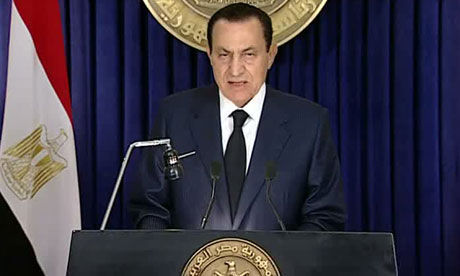Mubarak on Trial
Lots of good copy out of Cairo on the opening day of Mubarak’s trial. What a sight! The indispensible leader on a hospital bed, in a cage, flanked by his sons and six of his top cops. Anthony Shadid captures the scene gracefully (and his set-up piece is also worth reading).
WNYC’s The Takeaway had me on this morning to talk about the trial; you can listen here.
UPDATE:
WBUR’s Here & Now talked to Mahmoud Salem (author of the Sandmonkey blog) and then me at noon Eastern time, mainly about the prospect and peril of Egypt’s revolution turning to violence.
Mubarak Trial: Justice or Revenge?
Hosni Mubarak liked to imply that he united otherwise ungovernable Egyptians under his rule by sheer force of will. As he makes his debut in the defendant’s cage on Wednesday (a barbaric if quite photogenic tradition of the Egyptian justice system), he is bringing together a fractious coalition of Egyptians but not in the manner he intended: baying for his blood.
The most important question, though, isn’t whether Mubarak pays for his past deeds with his life, but how he pays, and for which of his regime’s alleged misdeeds.
A surprising number of people across the spectrum of class and political persuasion told me they’d like to see the dirtiest laundry of Mubarak’s reign aired at trial, followed by a cathartic public execution.
“I want him to hang in Tahrir Square,” a car parts dealer in the Cairo neighborhood of Boulaq told me, adding something blush-worthy about what he’d do to Mubarak if he could get his hands on the former president, which ended with the phrase “I’d make him my bride.”
With more sophisticated language, the revolutionary groups that until recently occupied Tahrir Square have made justice for Mubarak a central demand. Even the military presently ruling Egypt seems to have decided to cast its former chief to the wolves. The judiciary, some of whose key members owe their positions to Mubarak, have expediently and belatedly lent their support to a quick, public trial, perhaps realizing it is the key to their own future viability.
Families of martyrs circulate Tahrir Square demanding an accounting of their missing relatives, like Sayed Goma, 52, who has carried a portrait of his missing teenage son around his neck for the last six months. Nearly crazed with grief, Goma has quit his job as a driver, and talks incessantly of vengeance. “I want them all to go to hell,” he says of Mubarak and his entire ruling apparatus.
But this most unifying demand – that Mubarak be tried for the deaths of 846 or more Egyptians during the uprising that began on January 25 – avoids a reckoning of three decades of complex, nefarious and corrupt authoritarian misrule. A thorough accounting of the Mubarak era would require investigations and likely prosecutions for rampant torture, extrajudicial detention, manipulation of elections, state-sanctioned distortion, blackmail and infiltration of civic institutions ranging from universities and labor unions to professional syndicates and religious organizations. Then there’s the nearly ubiquitous corruption of economic life, in which the first-hand role of Mubarak’s family and inner-circle would barely amount to a prologue.
A sound and thorough judicial inquiry into all these abuses might take years, and certainly would require a renaissance in Egypt’s legal system, which still enjoys wide respect but has been tarnished by decades of crony appointments and arbitrary laws issued by Mubarak and regularly whitewashed by some quarters of the judiciary. It also would require the presumption of innocence for Mubarak, and at least the possibility of guilt for others, including senior military officers, currently enjoying full freedom.
How Mubarak is tried is just as important as what he is tried for. If the former president is charged only for the killing of demonstrators in 2011, or for the illegal enrichment of his nuclear family, the proceedings will tacitly condone the authoritarian system that Mubarak built and the excesses it promoted. Similarly, if the judicial process reeks of vengeance (or to the contrary, if it gives the former president a free pass), it will fail to pave the way toward a new standard of rule of law in Egypt.
Fresh Air
Terry Gross interviewed me on Fresh Air today about the events in Egypt and their potential to create new space in Arab politics. From the Fresh Air website:
All of our assumptions about the Arab world have been turned on their heads in the past month, says veteran Middle East correspondent Thanassis Cambanis.
“Everything that the experts say and everything that the activists and politicians have taken for granted for a generation, at least, is really off the table,” he tells Fresh Air‘s Terry Gross. “What’s been happening, first in Lebanon and then in Tunisia and now in Egypt and who knows further afield, suggests that new forces have been unleashed and we have no idea where they might lead and what new dynamics they might create.”
On Wednesday’s Fresh Air, Cambanis puts what has been going on in Egypt in a historical context — and explains the rising influence of the political party Hezbollah in the region. He says the recent explosion of popular anger and activism in Egypt opens up the possibility for a new political movement — one not endorsed by autocratic regimes or rooted in Hezbollah’s Islamist ideology.
“There are a lot of people, both dispossessed and powerful, who want dignity but they don’t necessarily want endless war — which is what the Hezbollah school of thought advocates,” he says. “I think they would be hungry for, and very receptive to, an Egypt-centered political movement that talks about Arab empowerment but not endless war.”
Waiting for Mubarak
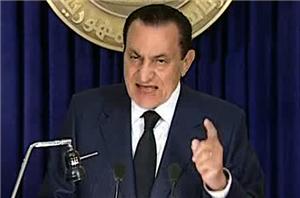 Mubarak’s speech tonight eerily evoked the tone of Iraqi Baathists in the spring of 2003. Even after Saddam had fled and American troops had occupied Iraq, I met Baathists in Baghdad who spoke to me with supreme confidence about their natural role running Iraq. They had no doubt that they would remain in charge, one way or another. It took them years to realize how much their nation had changed – and that the Iraqi people didn’t want to be ruled by some reconstituted version of Saddam’s regime.
Mubarak’s speech tonight eerily evoked the tone of Iraqi Baathists in the spring of 2003. Even after Saddam had fled and American troops had occupied Iraq, I met Baathists in Baghdad who spoke to me with supreme confidence about their natural role running Iraq. They had no doubt that they would remain in charge, one way or another. It took them years to realize how much their nation had changed – and that the Iraqi people didn’t want to be ruled by some reconstituted version of Saddam’s regime.
I don’t mean to compare Saddam to Mubarak, only to point out the parallels in the process of regime detachment, teetering, and imminent implosion. It’s possible that Mubarak’s advisers have shielded him from an accurate assessment of the events of the last week, and that he has a distorted picture of the size of the crowds, their sentiment, and the dim reputation of the Egyptian state among its own people.
For three decades, Mubarak has successfully convinced some of Egypt’s elites, and much of the West, that the only choice lay between his dictatorship and Islamic fundamentalists. Mubarak offered continuity and cooperation for the United States, but little else, since Egypt under NDP rule shrank in every indicator (political influence, economic growth, regional influence). The other option in this belabored formulation was a violent, extremist Islamist Egypt ruled by the likes of Ayman Zawahiri.
In reality, however, there was no political space in Egypt whatsoever beyond the platform the regime accorded itself and its organs. The Muslim Brotherhood and the officially sanctioned opposition were only able to function in public within the limited confines permitted by the regime. Consequently, their political development was stymied.
Right now, political space has opened for the first time. The loudest voices within it come from unknown Egyptians, and not from the activists and cadres who have toiled for years in the state-sanctioned opposition. Their preferences are little understood, and perhaps not yet fully developed. They want Mubarak gone, and they seem to want his coterie out as well. They want some form of accountability. Beyond that, we have no idea if they’re interested in forming new political movements and ideologies, or whether they will forge a new way in Arab politics, some platform of ideas distinct from Islamism and secular statist autocracy. If they do, we can guess it will sound less friendly to Washington and Israel than Mubarak’s regime did, and we can also guess it might have a more religious and populist tone. Beyond that, though, there’s little yet to suggest what real representative politics will sound like, or what kind of government might take shape, or what its foreign policy might be.
There is reason to believe, however, that a post-Mubarak and post-Days of Rage Egypt might be able to deliver some improvement in living conditions, morale and perhaps regional leadership to the Egyptian people — if only by dint of trying. And so far, there’s no reason to expect that the mass of protesters, and the inchoate political realm coalescing in its wake, will agitate for war and instability. They seem bent on living better than they have under Mubarak’s rule, not on recreating the 1960s and 1970s.
Things We Don’t Know
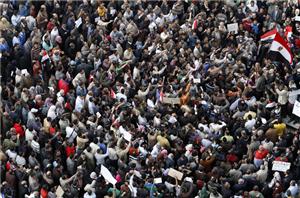 The unraveling of Mubarak’s regime has proceeded at a tremendously exciting pace over the weekend, spawning news, uncertainty, as well as a layer of ideologically-motivated posturing in the U.S. that is only confusing our still-murky view of the situation.
The unraveling of Mubarak’s regime has proceeded at a tremendously exciting pace over the weekend, spawning news, uncertainty, as well as a layer of ideologically-motivated posturing in the U.S. that is only confusing our still-murky view of the situation.
We still don’t have a full picture of exactly what’s happening now in Egypt. We don’t know what’s happening inside the military and inside the top levels of the regime. We don’t know exactly what kind of schemes the police have implemented, although there’s evidence of undercover cops looting and trying to provoke chaos. We don’t know how motivated the protesters are to organize for the long term – although we do know their actions until now have defied almost all expert predictions. We don’t know how many people have been killed and arrested. And we hardly know what’s happened beyond Cairo and Alexandria. We don’t know how it will all turn out.
Given that vast uncertainty, it’s all the more important that we don’t let ideologues exaggerate what we do know, or paint false pictures of the players involved. We do know that almost all of the protests have eschewed the language of Islamism, the Muslim Brotherhood, and the weak establishment opposition parties. We do know that most Egyptians don’t consider Mohammed ElBaradei an inspiring or charismatic figure, and that until this weekend most activists (secular as well as Islamists) viewed his year-long debut in Egyptian politics with disappointment or even frustration. We know that the Muslim Brotherhood has been reluctant to challenge Mubarak’s regime – declining to join bolder secular parties in boycotting last fall’s parliamentary elections, and sitting out the first rounds of the “Days of Anger” this January. Finally, we know that Egypt’s suffocated civil society boasts only a few institutions with national organizational reach: the military, the state security organs, the ruling National Democratic Party, the Muslim Brotherhood, and possibly the Coptic church. Even if they play little or no role in the protests, they’ll be positioned to capitalize most quickly on a post-Mubarak order.
When an authoritarian state collapses, it’s wise to watch players with existing capacity. It’s even wiser to recall that all bets are off. Once-omnipotent secret police can vanish in a day (it happened in Iraq in 2003). New populist parties can quickly emerge. Dormant or smothered institutions like labor unions can quickly reemerge with vigor, and new political parties can spring up to tap public sentiment. Forces like the popular committees organizing to protect Egyptian neighborhoods from looters and the police could easily morph into a potent political force.
So ignore anyone who tries to paint the situation today in Egypt as a simple struggle between a moderate authoritarian regime led by Mubarak and a fanatical Muslim Brotherhood poised to lead Egypt into war with Israel. That regime, as it existed until last week, will be forever changed by the Days of Rage if it survives in some form or another under President Suleiman. Multiple unknowns surround a Muslim Brotherhood that has acted anything but radical in the last three decades, but that’s largely beside the point; the Brothers simply don’t have the numbers or the dynamism to take over this popular revolt. They’ll be a key stakeholder in any new order, but there’s no evidence to suggest they’ll play a dominant role. The military will still be there next month. So will the labor unions, and so will the privileged class that backed Mubarak’s regime and which in Egypt’s next iteration will still channel much of its economic and political power. Egypt’s history of secular nationalism will surely shape events, as will a surging popular will that until last week was almost entirely a mystery.
Egypt’s military II
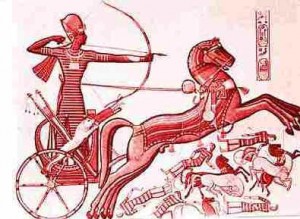 Michael Hanna elaborates his views on the Egyptian military’s role in a presidential transition at Democracy Arsenal. He brings up some of the crucial Mubarak era history (which I didn’t have room for in my NYT piece on the subject), in particular President Mubarak’s 1989 firing of the popular defense minister, Field Marshal Abu Ghazaleh.
Michael Hanna elaborates his views on the Egyptian military’s role in a presidential transition at Democracy Arsenal. He brings up some of the crucial Mubarak era history (which I didn’t have room for in my NYT piece on the subject), in particular President Mubarak’s 1989 firing of the popular defense minister, Field Marshal Abu Ghazaleh.
Michael writes:
It is hard to pinpoint the parameters of the military’s power within Egyptian society at this juncture. Yes, it is the most respected and coherent organization in the country, but Egypt does not fight wars anymore and the military is not involved in the day-to-day of politics. And, it has not been overtly involved in a presidential succession since 1952. While Anwar al-Sadat and Hosni Mubarak were both military men, they were hand-picked as vice-presidents by the president. There was no real process for the military to be involved beyond the sort of informal vetting that might have taken place internally prior to the their appointments. And it is also worth remembering that both al-Sadat and Mubarak were seen as weak figures with no broad popular legitimacy at the time they assumed the presidency, and, yet, the military regime did not attempt to block the ascension of either man to the post.
From an institutionalist perspective, the central question about Egypt remains what pathways exist beyond the mechanisms of power controlled personally by Hosni Mubarak. In the case of the military, it appears that its power must be substantially weaker than it was in 1970 or 1980, but how much weaker, and what control it has, are open and vital questions.
Egypt’s military and its next president
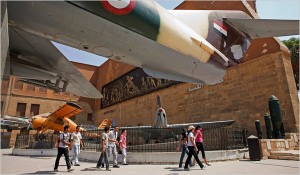 In Sunday’s New York Times I wrote about the Egyptian military’s central role in Egyptian society and what position it might take on the selection of President Hosni Mubarak’s successor. So much is opaque in Egypt’s power structure, and nobody outside Mubarak’s inner sanctum has a clear picture of how anything works, precisely. The retired military officers, opposition leaders, defense consultants, officials, and analysts that I interviewed are either expressing the views of an interested party in the case of the officials and politicians, or are cobbling together theories from a sort of reading of the tea leaves.
In Sunday’s New York Times I wrote about the Egyptian military’s central role in Egyptian society and what position it might take on the selection of President Hosni Mubarak’s successor. So much is opaque in Egypt’s power structure, and nobody outside Mubarak’s inner sanctum has a clear picture of how anything works, precisely. The retired military officers, opposition leaders, defense consultants, officials, and analysts that I interviewed are either expressing the views of an interested party in the case of the officials and politicians, or are cobbling together theories from a sort of reading of the tea leaves.
Even those who believe the military could play an important role have few ideas of how, in practice, the military would exercise that role. Possibilities include:
- A military coup, which most people said was unlikely.
- An expanded role in direct rule, for example by moving to completely shut down the Muslim Brotherhood.
- An internal negotiation with potential successors that protects the military’s continued privileged status
- A tense internal negotiation in which the military does not obtain the assurances it wants, and then seeks to undermine the next president.
- A weak successor who faces a public opinion crisis similar to the uproar in Egypt during the 2008-2009 Gaza war, when Mubarak kept the border closed and essentially sided with Israel over Hamas. In that case, one official source speculated, the military might organize a direct or indirect coup if it fears an ineffective president will be unable to keep domestic order in a time of crisis.
Issandr El Amrani, author of the excellent Arabist blog, gave me a very helpful interview for the story and elaborated further on his blog about the succession prospects. It’s worth reading the whole post, but here’s his thesis:
This situation, in a sense, is ideal for the military, confirming its central role and placing senior military officers — since we are probably talking about that rather than the army as a corporate entity — of winning either way: they will be wooed by Gamal (or any other successor) to support him and, if they decide not to, would easily garner popular support for their own candidate. Should they decide to support Gamal Mubarak, they need do nothing but sit back and allow the process concocted for his “legitimate” election to take place. If they decide against it, it will be most likely a decision taken behind the scenes rather than publicly, with the selection of the candidate taking place in collusion with elements of the ruling party rather than, as some have said, by tanks descending into the streets. A soft coup, if you will, if only because the regime as a whole in Egypt has an interest in preserving the myth of constitutional legitimacy — they would bend the rules, rather than break them altogether.
Stephan Roll, a Berlin-based researcher, also wrote about the military and succession at the Carnegie Endowment’s Arab Reform Bulletin (another version of the essay ran in Al Masry Al Youm’s English edition). He sees the military as a fulcrum point between the ruling party’s old guard and new guard.
For the first time in Egypt’s modern history, the business elite are playing a role in the succession question, but it is still not clear whether that role will be decisive. … So far, the military leadership has kept out of the power struggle between old and new guards inside the party and the government. In general, this neutrality seems to serve the interests of the old guard, as a positive signal by important military officers regarding the new guard and Gamal Mubarak would certainly give them a boost.
As with most of the questions about Mubarak’s successor, the most interesting decisions are likely to be made outside of the public eye, and many of them – like the military’s struggle to maintain its position, or like the ruling party’s internal split between two factions of very rich officials – might take several years to play out. The military has received nearly $40 billion from the United States, which prizes the Egyptian military’s stability and Washington-allied positions. The U.S. also appreciates the Egyptian military’s agreement to stay out of regional affairs, concentrating on defending Egypt’s regime and borders.
The military has much to lose in the transition, these officers and analysts say. Over the years, one-man rule eviscerated Egypt’s civilian institutions, creating a vacuum at the highest levels of government that the military willingly filled. “There aren’t any civilian institutions to fall back on,” said Michael Hanna, a fellow at the Century Foundation who has written about the Egyptian military. “It’s an open question how much power the military has, and they might not even know themselves.”

